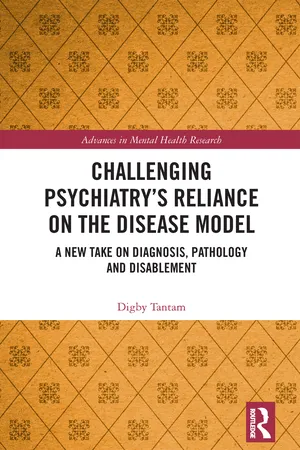
Challenging Psychiatry's Reliance on the Disease Model
A New Take on Diagnosis, Pathology and Disablement
- 268 pages
- English
- ePUB (mobile friendly)
- Only available on web
Challenging Psychiatry's Reliance on the Disease Model
A New Take on Diagnosis, Pathology and Disablement
About This Book
This volume critiques and challenges the use and promotion of the disease model in psychiatry, arguing that its misconceived approach prevents the preferred disablement model from becoming the default method to understand mental health conditions, including schizophrenia.
Featuring first-hand experiences as well as qualitative and quantitative findings, the book posits that mental illnesses are an expression of disablement, not disease, and that the alternative disablement approach (already being applied in the psychiatry of neurodevelopmental disorders but applicable to mental illness, too) allows for greater dignity and autonomy for the patient, collaboration between medical professionals, a replacement of categorical approaches with more appropriate dimensional ones, and a liberation from the restrictive idea of a 'cure'. The initial chapters of the book summarize the now overwhelming evidence that the disease model is flawed, as is the simplistic materialism that psychiatry has built around the concept of the brain as a kind of standalone biological computer. The later chapters consider the currently existent alternatives to the disease model and put forward the evidence for a psychiatry based on the person, as described by the philosopher Heidegger among others.
This volume will appeal to researchers, scholars, and postgraduate students in clinical psychiatry, mental health research, and psychotherapy. Psychologists and clinicians active in research or teaching in mental health will also benefit from this volume.
Frequently asked questions
Information
Table of contents
- Cover
- Endorsements
- Half Title
- Series
- Title
- Copyright
- Dedication
- Contents
- Acknowledgements
- Preface
- Introduction
- 1 The origins of psychiatric disease theory
- 2 Materialism as a symptom
- 3 Does diagnosis always imply disease?
- 4 Investigating psychiatry’s preoccupation with disease
- 5 Differential diagnosis and other approaches to mental health conditions
- 6 Prescribing the cure
- 7 Neurodevelopmental disorder as a model for every mental health condition
- 8 Management of schizophrenia: widening the neurodevelopmental model to all mental health conditions
- 9 A possible new future for psychiatry
- Index